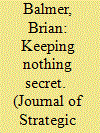| Srl | Item |
| 1 |
ID:
100673


|
|
|
|
|
| Publication |
2010.
|
| Summary/Abstract |
After renouncing an offensive chemical warfare programme in 1956, the UK Cabinet Defence Committee decided in 1963 to re-acquire a chemical warfare retaliatory capability. This article describes how the re-acquisition decision was engendered by a combination of novel research findings, changes in strategic thinking, new intelligence and pressures from NATO. Despite the 1963 decision, no new chemical weapons capability was acquired by the UK and information that Britain lacked a stockpile of chemical weapons was eventually leaked to the public, initiating a fierce debate between ministries over the significance of this leak. This paper argues that non-existent technology is equally problematic for government secrecy, and equally consequential for government action, as what exists. Furthermore, actors' different interpretations of what constituted a secret, point towards a more subtle understanding of secrecy than simply construing it as the hiding or uncovering of items of information.
|
|
|
|
|
|
|
|
|
|
|
|
|
|
|
|
| 2 |
ID:
182957


|
|
|
|
|
| Summary/Abstract |
The Women’s International League for Peace and Freedom (WILPF) is the oldest active women’s peace organization in the world. Although their overall aim is the abolition of all war, from the outset they voiced particular opposition to chemical warfare. Later, this became a call against both chemical and biological warfare (CBW). This article draws on archival documents to trace this history, concentrating on the early days of WILPF and then on revived interest in the topic during the late 1960s and early 1970s. While early WILPF did not define CBW as an issue with any special gendered relevance for women, the historical record shows WILPF placed emphasis on its leading role in organizing opposition. It also shows a consistency of approach, WILPF often acting in an educational capacity as an informer of public opinion about the horrors of CBW. Over time, WILPF’s role changed in that the leaders of the key campaigns against CBW came to regard their role as distinct from those of scientists.
|
|
|
|
|
|
|
|
|
|
|
|
|
|
|
|